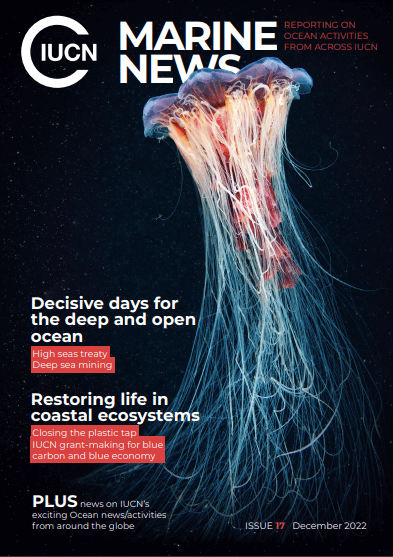2022 has been and continues to be a year of promise for the ocean’s wellbeing. Widely termed the “super year” for the ocean, due to the many important conferences where ocean health has been a focus of attention, there has been much progress this year towards the recovery and sustainable use of the ocean.
At the beginning of February, the One Ocean Summit in Brest, called by France’s President Macron, kicked off the Ocean Year, pushing progress towards achieving Sustainable Development Goal 14 (SDG14) with such measures as the launch of the High Ambition Coalition for Biodiversity Beyond National Jurisdiction and a redoubling of the international initiative to achieve 30% protection of the planet’s land and ocean by 2030 (30×30). And then at the end of February in Nairobi, the United Nations Environment Assembly adopted a consensual resolution to negotiate a binding international treaty to stop plastic pollution. We now have hope that the plague of plastic pollution we have inflicted upon Nature can be curtailed.
Momentum was maintained in June with the World Trade Organization Ministerial Conference’s landmark decision to end harmful fisheries subsidies in conformity with SDG14.6. Pressure is now on for two thirds of Parties to deposit their “instruments of acceptance” with WTO to bring the decision into force. The same month witnessed the UN Ocean Conference in Lisbon, co-hosted by the Governments of Portugal and Kenya, where over 6,000 participants, including scores of national leaders and hundreds of youth representatives, brought their solutions and commitments to the table in support of SDG14. In August, attention turned to the Intergovernmental Conference on Marine Biodiversity Beyond Areas of National Jurisdiction (BBNJ) in New York, and whilst delegates were unable to get a treaty text over the line, the necessary groundwork was laid for a successful conclusion of negotiations when they resume in the first half of 2023.
We closed the year with the two crucial Conference of Parties on climate and on biodiversity. The UNFCCC COP27 in Egypt no doubt benefitted from the UNFCCC’s increased recognition of the role of the ocean in climate change mitigation and adaptation (the “Glasgow Pact”), with the first of the UNFCCC’s Ocean and Climate Change Dialogues having been held in Bonn in June. Be it in food, energy, communications, or health, we see growing acceptance that the Sustainable Blue Economy underpins the future of human security on this planet. Thus, there is an urgent requirement for the climate finance needle to move decisively in its direction and we hope to see evidence of this emerge after COP27.
2022’s ocean agenda wrapped up in Montreal in December with the Convention on Biological Diversity’s COP 15, where over one hundred Parties called for 30×30’s inclusion in the Post-2020 Biodiversity Framework. With the adoption of the framework in Montreal, we will be heading towards a massive work programme to effectively govern and finance marine protected areas (MPAs). These will range from highly protected MPAs to Other Effective Conservation Measures, which taken together with FAO’s work in the management of fish-stocks, will tackle the spectre of biodiversity loss in the ocean. Personally, I believe there is a need for well-resourced international fund to ensure effective establishment and governance of MPAs, with a universal, distance-neutral toll on international shipping being the obvious source of funding.
As the Ocean Super Year draws to an end, there will be little time to recharge our batteries. To ensure promises are kept, to enable ambition to be realised in action, and to begin to see meaningful reversals in the decline of ocean health, we must forge into 2023 with renewed will. The road from Montreal leads to Vancouver, where we will gather in early February at the IMPAC5 conference (see pages 6 and 7) to strengthen, finance, and greatly multiply the Marine Protected Areas of the planet, and in so doing will collectively build a roadmap for the achievement of 30×30 and the safeguarding of what remains of Nature’s bounty.
***
Guest Editorial by H.E. Ambassador Peter Thomson, United Nations Secretary-General’s Special Envoy for the Ocean
Read the full IUCN – Marine News issue
